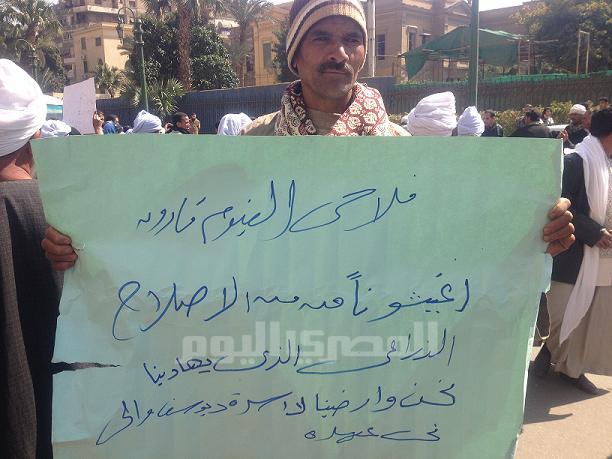
More than 100 farmers from Fayoum protested Monday in front of the justice and interior ministries in downtown Cairo in response to the government’s handling of a land conflict between them and the family of former Agriculture and Land Reclamation Minister Youssef Wally.
The conflict stretches back to 1997, when members of the Wally family had security forces evict 245 farmers from an almost 400-feddan tract of land, which had been granted to their parents in 1967 by former President Gamal Abdel Nasser as part of the first agrarian reform law issued after the 1952 revolution.
Beneficiaries included farmers who had participated in the North Yemen Civil War and the 1967 Egypt-Israel war, as well as those who had no source of income aside from agriculture.
For 30 years, from 1967 to 1997, farmers paid taxes to the Agriculture Reform Authority, which would render them eligible to eventually own the land. However, the land was reportedly sold in a secret tender to Wally’s family back in 1997.
Since the 1990s, similar disputes over land have occurred between big agrarian owners and small farmers, especially in the wake of the new 1997 agrarian reform law, passed by a Parliament predominantly controlled by the former ruling National Democratic Party stalwarts — many of whom are land owners. The law stipulated that rent for land should be sensitive to market prices, and empowered land owners to increase the rent on an annual basis, which was difficult for small tenant farmers to sustain.
Right after the 25 January uprising, farmers and their families returned to their lands in Fayoum and started to farm strategic crops, such as corn and wheat, according to Hafez Abdel Mawla, head of the Small Farmers Syndicate in the village of Khalta, located in Fayoum’s Qarun district. Abdel Mawla was imprisoned for seven years during the Wally era for his refusal to leave his father’s land to Wally’s nephew, Omar Abu Gabal.
In order to claim their legal rights, the farmers have filed a court case against members of the Wally family. The Justice Ministry Office of Experts is now studying the case.
The Wally family members, on the other hand, have filed more than 57 criminal cases against farmers, condemning them for allegedly stealing crops that were on the land before the revolution. These court cases resulted in 15 years of prison for eight farmers, who were convicted two weeks ago of stealing 100 kg of green beans from a few feddans in Khalta village.
The court decision stimulated a series of protests beginning on 27 February in front of the Parliament building in Cairo. On that day, farmers handed their files to members of Parliament and were promised a meeting with the Proposals and Complaints Committee. However, they have not yet heard back.
“Wally gives orders from prison. He and his family have a say in courts and in the police. We feel that the revolution is being stolen from us, and we don’t know what to do,” said Shaaban Abdel Tawab, one of the eight farmers sentenced to prison.
Wally was recently sentenced to 10 years in prison on corruption charges during his position as agriculture minister.
“There was a systematic plan to get rid of small farmers in Fayoum by large investors, as well as businessmen who were also part of the [Mubarak] regime, and we think that this seems to be continuing. This is to the detriment of the country, because we need to produce strategic crops — not large fields of fruits and vegetables for export, like what Wally did,” Abdel Tawab said. He reiterated the importance of getting lands back for the sake of the country as a whole.
After long hours of waiting, four protesters were able to meet the deputy justice minister, who promised to review their file and meet their lawyers on 14 March.
At the Interior Ministry, farmers called on officers to follow the rule of law and for the ministry to cleanse the police forces of corrupt officers who are still committing violations in favor of Wally and his family.


